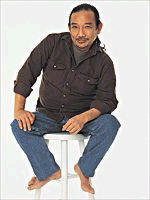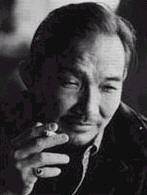 |


|
|
Japanese American Gay, Health Care and Civil Rights Activist May 9, 1943-- May 10, 2000 |
|
By Scott Tucker
A eulogy from the memorial at St. Luke's Episcopal Church, Philadelphia, May 23, 2000
He was brilliant and darkly moody, easy-going and difficult, open hearted and sharp minded. In fact, any picture you paint of him needs strong lights and shadows, and if you set him to music there would be plenty of dissonance in the general harmony. This made him an unpredictable and fascinating friend. He loved telling stories, but they always went beyond me, myself, and I. His personal accounts were very often historical as well, because he had crossed paths with Martin Luther King, Jr. and Buckminster Fuller; he had been jailed and beaten in the civil rights movement against racial segregation; he marched for gay rights as early as July 4, 1965 in front of Independence Hall; he advocated peace during the Vietnam war; and during the AIDS epidemic, he brought his class-conscious and anti-racist values into the movement for universal health care. He was a founding member of ACT UP Philadelphia; a member of We, the People; and the heart and mind of the Critical Path AIDS Project (www.critpath.org). If Thomas Paine, one of the true revolutionaries of the American Revolution, has not yet had a statue erected in his memory anyplace near Independence Hall, then it's also unlikely that we will see a statue of Kiyoshi in this city anytime soon. Besides, a statue was not his style.
Kiyoshi was born on May 10, 1943 and died this month one day after his 57th birthday. His birthplace was Heart Mountain in northwest Wyoming, where the government had established one of the prison camps for Japanese Americans citizens which were officially called "relocation centers." Citizens were removed from their homes, schools, and workplaces, and were crowded into tarpapered barracks surrounded by chain link fences, barbed wire, and guard towers. Heart Mountain itself was swept by severe winters and duststorms, but despite these conditions the people there found the will and the way to improve their quarters, to plant gardens, and to print newspapers. In January 1944 the government began drafting some of the prisoners in these camps into the military. Of those, most accepted the draft as a way to prove loyalty in time of war; but a minority chose civil disobedience as a way to regain the rights of citizens, and Heart Mountain was the site of the most organized resistance. According to a government report found among Kiyoshi's books after his death, "The resisters argued that their cases were test cases to clarify their citizenship rights. They were tried, convicted, and sentenced to three years in federal prison; appeals failed... In 1947, a Presidential pardon was granted to those who had been convicted." And finally, towards the end of the century, the government made modest reparations to Japanese American citizens whose constitutional rights had been so deeply violated. Why is it so important to remember such events in our national history at Kiyoshi's memorial? Because memory and history were a precious part of his own being; because he and his mother, Emiko Kuromiya, revisited the place of his birth; because a framed photograph of Heart Mountain was displayed in his home; because from such a beginning he went on to challenge injustice and champion civil rights and liberties throughout his life. He took that complex karma and became a kind and clear-minded human being. One of the stories Kiyoshi loved to tell most often also gives us a glimpse into his own character and into a still troubling time in our history. In 1968 he wrote a flyer protesting the use of napalm in Vietnam, and drew a crowd of thousands who were concerned that he would burn a dog alive at the University of Pennsylvania's Van Pelt Library, just as he had announced. Once they had gathered, he passed out another flyer among them: "Congratulations on your anti-napalm protest. You saved the life of a dog. Now, how about saving the lives of tens of thousands of people in Vietnam." This guy not only made ripples, like the proverbial pebble dropped in a pond. Through tried and true methods of direct action and through the uncharted waters of the early internet, Kiyoshi was a one-man tsunami.
 Since we are in a church which has truly sheltered ACT UP members and people
with AIDS throughout this epidemic, that's all the more reason to mention
Kiyoshi's own faith. It was a special blend of rationalism and mysticism,
as the books he collected and his own words prove.
Since we are in a church which has truly sheltered ACT UP members and people
with AIDS throughout this epidemic, that's all the more reason to mention
Kiyoshi's own faith. It was a special blend of rationalism and mysticism,
as the books he collected and his own words prove.
He read everything from Einstein to Madame Blavatsky; he kept up to date on immunology and practiced kundalini yoga. He was never systematic about his spirituality, and never a crusader for one true faith. He knew too much blood has been spilled over the earth and time in the name of God, and never felt at home in organized religions. But the words of Buckminster Fuller, which Kiyoshi helped polish and publish in the book Cosmography, could have been his own: "...I committed myself as completely as humans can to an absolute faith in the wisdom of the eternal intellectual integrity we speak of as God." That will never satisfy fundamentalists, but Kiyoshi couldn't care less, wherever his karma and energy may be in the universe now. Kiyoshi was in love with certain mathematical, geometrical, and crystalline structures of nature, and his great mentor in this respect was again Buckminster Fuller. This faith in forms and numbers can be traced all the way back to Pythagoras and other ancient philosophers, and was resurrected later by some Christian theologians. The very word philosophy means love of wisdom, and in this sense Kiyoshi ranks among the great romantics. He truly believed that the order of nature is, ultimately, not only reasonable but also benevolent. "Information is power"- that was Kiyoshi's mantra. Not the usual motto found carved above so many institutional portals, namely, "Knowledge is power." Information is really the building blocks of knowledge; it's the raw data that gets organized into knowledge. But Kiyoshi began with basics: not with the abstraction, but with the stuff of everyday experience and of experiment. He was democratic almost by instinct. And real wisdom is a third thing altogether-- namely, knowledge blended with kindness over the course of a lifetime. Kiyoshi was informed, he was knowledgeable, he was wise: all three. But he put information first because that's where the most people will encounter the fewest obstacles, if only given the chance. That's why Kiyoshi became such a great teacher for people who were literally dying for lack of information. Information means two and two equals four; it means the ways in which cells divide and leaves turn green; it's the fact that salt crystals are shaped like cubes and snow-flakes have six sides; it's the five-fold symmetry of so many plants and animals. This is the order of nature Kiyoshi loved and trusted, a natural order which had plenty of room for intelligent creatures who do or who do not happen to reproduce. For queers, we might say, of all kinds. He believed in conscious evolution, which is entirely compatible with much of Asian philosophy and faith. Transformation of mind and energy was just what the Buddha taught in India well over two thousand years ago. This was also what Kiyoshi rediscovered in the works of Fuller and other modern inventors and scientists. All of that sounds like sweetness and light, but we know that this world of injustice and suffering does not always make sense to us. Chaos and loss are not bad places to learn something new. When our personal and social worlds fall apart, that's when we have the chance to begin again and pay attention. When Kiyoshi lay dying he was surrounded by friends, neighbors, and comrades who loved and cared for him. When someone you love dies they also teach you a lesson only learned the hard way--namely, that if your own self always comes first, then you will add to the sum total of suffering in your own life and in the world. Selfishness is self-defeating, but if that's all we learn from suffering then we are still trapped in selfishness. Some of Kiyoshi's last words and conscious moments concerned the well-being of others. He was not spared suffering or death, and none of us are. But even when he was dying he was kind and wise. Should a memorial of this kind be a political event? Given Kiyoshi's life, how could it not be? He had high hopes that the knowledge and practice of science and medicine would become more democratic, that housing, health care, and education would cease to be class and racial privileges but would be taken for granted as human rights. In this sense, two recent events may show the tide of history beginning to turn against a mass media, a bipartisan government, and a corporate economy that are increasingly anti-democratic. There was a citizen uprising in Seattle against the World Bank and World Trade Organization, and not even tear gas and truncheons could enforce business as usual. Even The New York Times saw fit to print that news. More recently, there was another citizen uprising in Washington, D.C. against those same global institutions. And don't forget to join protests in Philadelphia against the Republican National Convention on July 29. The local chapter of ACT UP has joined other groups in fighting the corporate trade policies which have restricted the production and sales of life-saving drugs in African and other nations. Gore has been heckled and haunted on his campaign trail for his disgraceful collaboration in those policies, and perseverance has paid off. The AIDS epidemic beyond our own borders is rightly becoming a matter of conscience for greater numbers of our own citizens. If we pay attention to AIDS, we must pay attention to the much wider global crisis in health care. The class struggles of the next century will often be struggles over information, research, and the technology of communications. Kiyoshi saw all this coming, and he was one of the kindest and wisest warriors in these battles. We will miss him terribly among our ranks. Shortly after Kiyoshi's death, while friends were still gathered round his bed, the last verses of the Heart Sutra were read, including the ancient Pali mantra which is still recited among Buddhists to allay suffering and to increase the enlightenment of all beings: Om gate gate paragate parasamgate bodhi svaha! Gone, gone, gone beyond, gone altogether beyond: all hail the Awakened One! Kiyoshi is truly gone, and he is truly present. Both are true at the same time. That is what breaks our hearts and that is what heals them. We are grateful to his family for giving us such a friend and teacher, and now his being will remain both in memory and in history. If his faith is true, then he still belongs here and now and in the order of nature. |

© 1997-2000 BEI
 Kiyoshi Kuromiya was and is a spiritual star in our lives, absorbing and
radiating immense amounts of information and energy. Any person that
radiant will sometimes cast a strong shadow, but this simply confirms his
humanity.
Kiyoshi Kuromiya was and is a spiritual star in our lives, absorbing and
radiating immense amounts of information and energy. Any person that
radiant will sometimes cast a strong shadow, but this simply confirms his
humanity.